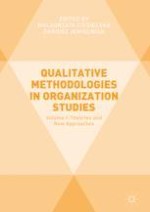2018 | OriginalPaper | Buchkapitel
3. Grounded Theory
verfasst von : Przemysław Hensel, Beata Glinka
Erschienen in: Qualitative Methodologies in Organization Studies
Aktivieren Sie unsere intelligente Suche, um passende Fachinhalte oder Patente zu finden.
Wählen Sie Textabschnitte aus um mit Künstlicher Intelligenz passenden Patente zu finden. powered by
Markieren Sie Textabschnitte, um KI-gestützt weitere passende Inhalte zu finden. powered by
